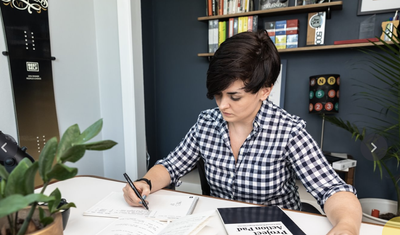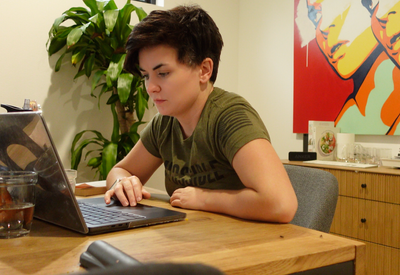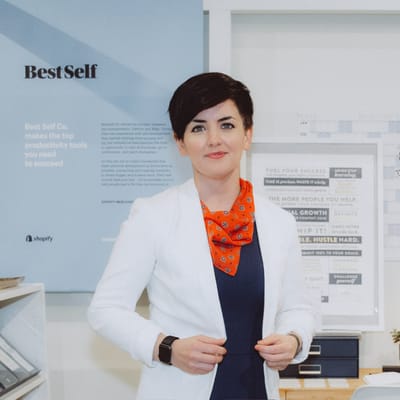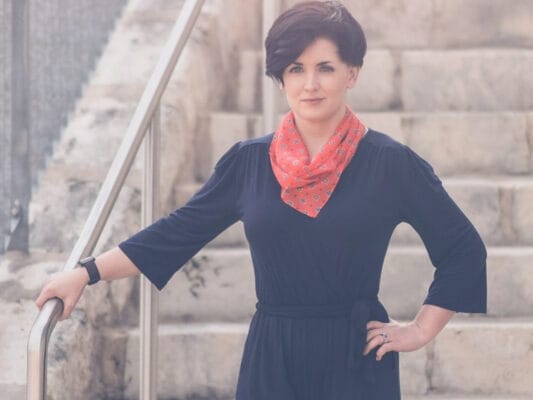
Over the past few years, I feel like I’ve gone from dipping my toe in the pool of entrepreneurship to jumping off the highest diving board right into the thick of it all. With that said, I feel like I’ve designed a life that I love, rather than the one I (secretly?) wished to escape from.
I was entrepreneurial from a young age, always cooking up ideas on how to make some extra pocket money. Whether it was washing cars in the neighborhood, selling cupcakes in the school playground, or setting up an eBay drop-ship business at age 13 (I sold The Dawson’s Creek Full Series DVD Collection which wasn’t available in the UK or Ireland at the time. The say sell what you know, right?), I was an entrepreneur.
I had my first “recurring revenue” business at age nine. It involved getting my brothers to pay each time they used my charger to charge their rechargeable batteries.
Then I “grew up.” I got focused on school and left my business adventures behind me. I went to university to study architecture.
After almost seven years of working and studying, I earned a BA (Hons), DipArch, and MArch. With all those letters after my name, I felt I had to be bound for success, right?
Sure…
I got offered a job in architecture in New York City and left the UK/Ireland to begin my life in the United States. Little did I know that after two years of working, I’d be desperate to escape corporate America and, what I called, Archi-torture.
New York State of Mind
I worked 60-hour weeks, was made to feel bad when I took any mandatory time off and had a pay scale that I felt didn’t reflect my true value.
Through reading books such as Rich Dad, Poor Dad and The 4-Hour Workweek on my subway commutes, I realized that I didn’t want to exchange the bulk of my time for little money any longer.
After reading The $100 Startup by Chris Guillebeau, I was inspired to start a side business freelancing and selling design prints that I and a couple of friends would create for fun. Don’t tell Chris, but it was more like a $500 startup.
However, it was extremely lean, and, more importantly, it was an intersection of my two passions: design and entrepreneurship. I considered it a vehicle to freedom that would help me someday escape the rat race while giving me the time to realize my full potential.
After 18 months of saving and grinding away at my hectic job while pursuing my new personal adventure, I decided to work my architecture job only part-time – and on a 3-month trial basis. It was a calculated risk. If I failed or hated working for myself, I could always just go back to the grind.
Turns out I loved working for myself. I never wanted a “real job” again.
I wanted a challenge to keep me on my toes, but I also needed to feel secure while working on this new freedom. (I didn’t want to go back to my dreaded job.) I had known about an entrepreneurship course called The Foundation through podcasts such as Mixergy, but now it seemed like it was really calling out to me.
“When the student is ready, the teacher will appear.”
The Foundation
Through learning success stories from The Foundation alumni Sam Ovens, Carl Mattiola, Josh Isaak, Esther de Boer, and Renata Haute (to name only a few), I knew I wanted that. Their stories were authentic because they didn’t show up talking about some get-rich-quick scheme to make money online.
Unlike any other business courses I’ve seen, they talked about their mindset shifts and how through overcoming limiting beliefs and creating a new identity they were able to build successful businesses.
Furthermore, these businesses, for the most part, became 5 - 6 figure per month SaaS (Software as a Service) businesses, which is no easy feat.
I joined The Foundation on November 17, 2013. At the time, it cost me $4,500 – the most money I’d ever spent on one single thing! It was more than my credit card limit supposedly allowed (by $500), so I didn’t think it would even go through. It did, however, and I was in.
Spoiler: best money I ever spent.
I know what some of you are thinking: WTF is The Foundation? On their website, they describe it as, “An online mentoring program guiding entrepreneurs to start and scale software companies, from scratch, as quickly as possible. Even if they have no idea what to build, or any software experience at all. Students take our program virtually from all over the world.”
How do I describe it? Building something of value in the world from scratch, uniting with like-minded entrepreneurs, and joining the Value Economy (not trading my time for money).
On November 26, 2013, the eve before my 27th birthday, I left my architecture job for good. And I was scared. No, that’s not it. I was terrified.
At 27 years old, I was unemployed for the first time in my life. I was splitting my time between Calm The Ham, my design/Shopify business, and going through the Foundation framework.
I remember in the first few weeks we were asked to define our “Why.” Defining the purpose and primary motivation behind our actions, helped us to gain clarity on what our ultimate goals were and why we were on this journey.
The designer in me decided to make a personal WHY poster for my wall so I could see it every day when I was working. I didn’t realize how important it would be until about two months in when the daily minutia of cold calling, trying to get decision-makers on the phone, and frequently being rejected had set in.
Having that poster on my wall staring at me day in and day out kept me motivated to keep going.
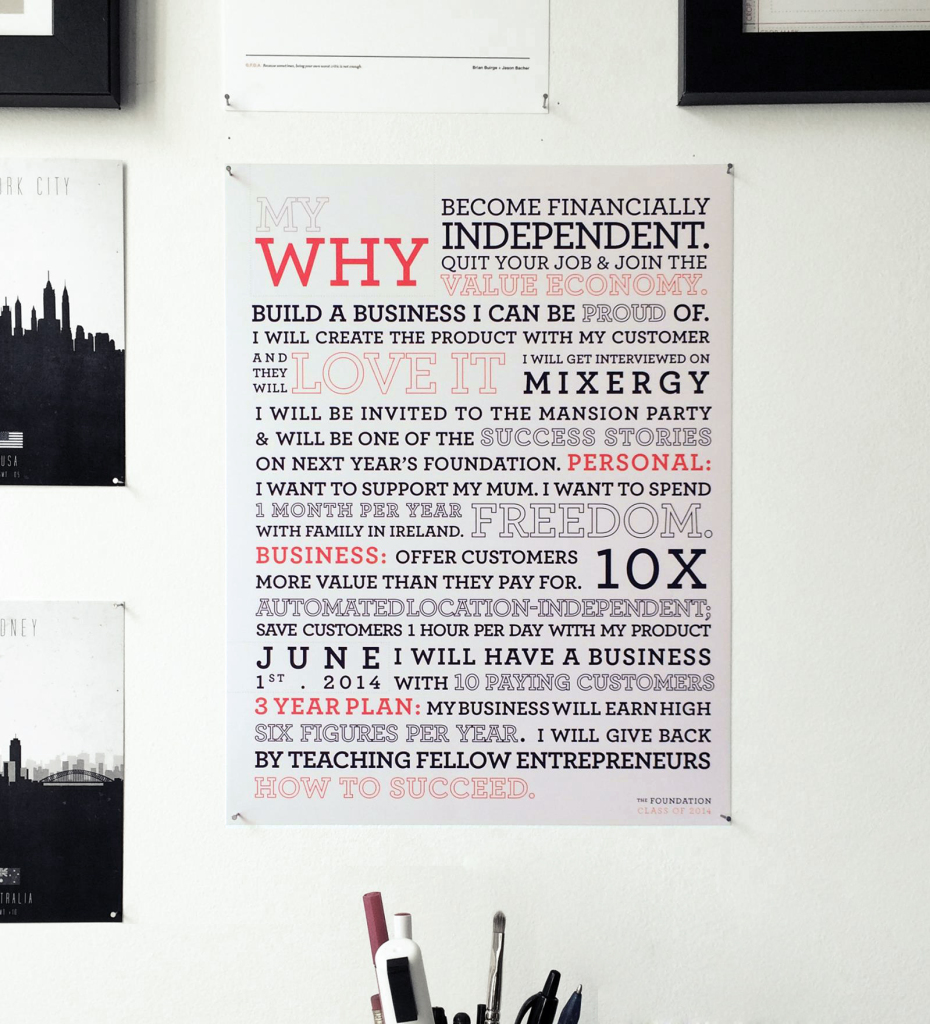
This was on my wall for every idea extraction call, outbound email, cold call, pre-sales call, virtual demonstration… everything. (I have the Holstee Manifesto, the inspiration for my WHY poster, on my wall as well. I love it.)
Being a business owner (with my Design Print business) didn’t help make me a better student at The Foundation, but rather being a student at The Foundation made me a better business owner.
I was able to do more for my business while in the Foundation than I was doing before.
- Fulfillment: Until April 2014, I was still fulfilling all orders through my store myself, from my New York City apartment. This was a total waste of my mental energy, living space (during the holiday season my apartment looked more like a shipping warehouse), and most importantly, my time. My Foundation coach, Dennis, convinced me to get this off my hands. I took his advice and stepped away from everything else to solve it. Guess what? This huge issue that was costing me huge energy, time, and money that I had been ignoring was solved within three weeks. I found a fulfillment company that suited my needs, signed a contract, and shipped everything to Minnesota. I got my apartment back, and I no longer had to deal with USPS and UPS. Success!
- Kickstarter: It was another foundation student, Justin Thomas (founder of Craftsquatch), who convinced me to do a Kickstarter campaign while at a conference in Portland. My negative mindset asked who would want to fund me. But then thought, Why not? It was something new and uncomfortable, so I had to try it. Why couldn’t I pre-sell a product via Kickstarter like we pre-sell a SaaS solution in The Foundation? Three weeks later I had concluded my research into what makes a successful Kickstarter project, filmed my video, and launched my campaign. I raised $25,161 for that project in May. (The Filmography of Aircraft reached 838% of my goal.) I just finished another project that raised $45,905. (The Filmography of Guns reached 706% of my goal.)
- Building Systems: After spending time with high-level entrepreneurs and seeing how they work, I started to build systems and processes into the business to take things out of my hands. This is still a work in progress (and something I will be sharing in future posts), however, it has allowed me to leverage my talents
At the end of the course’s six months, I had five customers pre-sold on my SaaS product, and I was beginning development.
The big secret? I took action every day. Whether it was big or small, I was following the course’s framework and doing my best to move the needle.
Speed of implementation is crucial to success. Just between us, I have not yet completed the foundation modules. The last module is about scaling the business, but since I am not at that point yet why would I need to be learning about that? Exactly.
Only digest content you can implement right away, or you’ll forget it. Think about it this way: your competition only has 24 hours in their day too. What’s the best way you can optimize your time and skill set so you can compete (and dominate)?
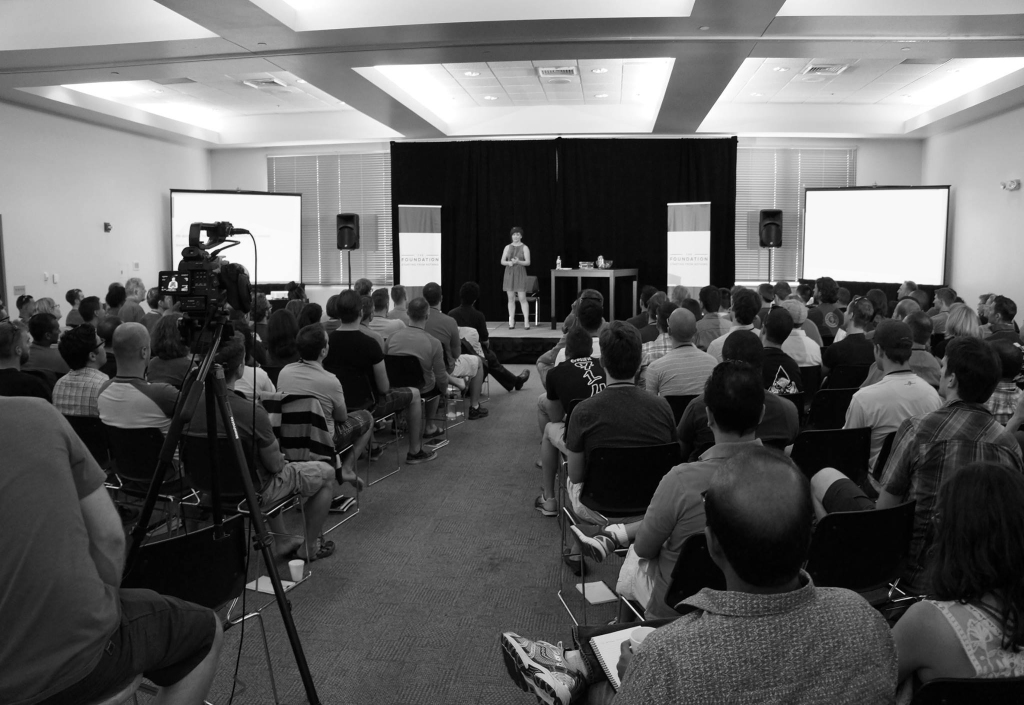
I was considered one of the “success stories” of this year’s class after closing $6,000 in pre-sales for my new company ClinicHero, and I was voted “Biggest Transformation” at their live event.
While the pre-sales were really awesome, they didn’t compare with the mindset shift I’ve experienced or the connections I’ve established, and that’s how I measure my success in the program. If this new business doesn’t work out, I know I have the tools to create value in other ways.
Post-Foundation
Just last week I onboarded my first user onto my SaaS product ClinicHero. The other users who pre-bought the solution will be onboarded in the next few weeks. I’m turning back on my outbound sales process to get more users onto the product.
It will be interesting going from pre-selling a product that doesn’t yet exist to selling one that does.
“You are the average of the five people you spend the most time with.”
The underlying message of the quote above is that the people you surround yourself with can elevate you as much as they can bring you down. Why not choose to be elevated?
I recently joined the high-level Mastermind group Sterling Assembly, founded by Carl Mattiola and Josh Isaak. Early this month (October 2014), we spent four intense days staying in a house in Austin, Texas where we took part in skill workshops, business hotseats, and idea brainstorming.
If you’re serious about being an entrepreneur, I would strongly recommend you find or create a community of like-minded entrepreneurs who are willing to learn and commit to their success. It will help you grow. And it’s fun as hell.
That’s all, Folks! I would love to hear your thoughts, questions, and your entrepreneurial journeys in the comments. Thanks so much.
Become a subscriber receive the latest updates in your inbox.

